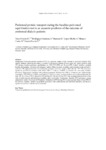Peritoneal protein transport during the baseline peritoneal equilibration test is an accurate predictor of the outcome of peritoneal dialysis patients

Ver/Abrir
Use este enlace para citar
http://hdl.handle.net/2183/19197Colecciones
- Investigación (FCS) [1293]
Metadatos
Mostrar el registro completo del ítemTítulo
Peritoneal protein transport during the baseline peritoneal equilibration test is an accurate predictor of the outcome of peritoneal dialysis patientsAutor(es)
Fecha
2010Cita bibliográfica
Pérez-Fontán M, Rodríguez-Carmona A, Barreda D. López-Muñiz A, Blanco-Castro N, García-Falcón T. Peritoneal protein transport during the baseline peritoneal equilibration test is an accurate predictor of the outcome of peritoneal dialysis patients. Nephron Clin Pract. 2010;116(2):104-113
Resumen
[Abstract] Background: Peritoneal protein excretion (PPE) is a potential marker of the outcome in peritoneal dialysis (PD) patients. Method: Observational study of a cohort of 269 patients starting PD in a single unit. Study variables: total PPE during a baseline peritoneal equilibration test (PET; PET-PPE) and 24-hour PPE. Control variables: essential baseline demographic, laboratory and adequacy markers. Main outcomes: mortality, cardiovascular events and risk of peritonitis. We applied univariate and multivariate strategies of survival analysis. Main Results: PET-PPE sustained a significant, yet limited correlation with 24-hour PPE (r = 0.46, p < 0.0005). At baseline, the main study variables showed an independent correlation with peritoneal transport characteristics (D/P240’ creatinine) and cardiovascular comorbidity. PET-PPE (p < 0.0005, model global χ2 59.4) was a more accurate predictor of overall mortality than 24-hour PPE (p = 0.04, χ2 50.5). Moreover, PPE during PET, but not 24-hour PPE, was an independent predictor of the risks of cardiovascular and infectious mortality, and of peritonitis. Conclusions: Baseline PPE represents a strong independent marker of survival of PD patients. Estimation of PPE during PET is more accurate than 24-hour PPE for this purpose, sustains a definite independent association with cardiovascular and infectious mortality, and shows a significant correlation with the risk of peritonitis.
Palabras clave
Peritoneal equilibration test
Protein transport
Cardiovascular diseases
Mortality
Peritonitis
Protein transport
Cardiovascular diseases
Mortality
Peritonitis
Versión del editor
ISSN
1660-2110
1660-8151
1660-8151
Ítems relacionados
Mostrando ítems relacionados por Título, autor o materia.
-
Significado de la celularidad peritoneal basal: más allá del diagnóstico de infección peritoneal en diálisis peritoneal
García Gago, L.; Bravo González-Blas, L.; Otero Alonso, P.; López-Iglesias, Antía; García Enríquez, Alba; Rodríguez-Carmona, Ana; García Falcón, María Teresa; Pérez-Fontán, Miguel (Elsevier, 2018) -
Analysis of ultrafiltration failure diagnosed at the initiation of peritoneal dialysis with the help of peritoneal equilibration tests with complete drainage at sixty minutes: a longitudinal study
Machado Lopes, Daniela; García Falcón, María Teresa; Rodríguez Carmona, Ana; López-Muñiz, Andrés; Ferreiro-Hermida, Tamara; López-Iglesias, Antía; Pérez-Fontán, Miguel (SAGE, 2016-01-13)[Abstract] Background: Ultrafiltration failure (UFF) diagnosed at the initiation of peritoneal dialysis (PD) has been insufficiently characterized. In particular, few longitudinal studies have analyzed the time course of ... -
Persistent overhydration associates a significant risk of peritoneal infection with enteric germs in patients treated with peritoneal dialysis
Fiel, D. Carvalho; Pérez-Fontán, Miguel; López-Iglesias, Antía; Bravo González-Blas, L.; García Gago, L.; García Falcón, María Teresa; Rodríguez-Carmona, Ana (Elsevier, 2019-11)[Abstract] Background: Overhydration (OH) complicates frequently the clinical course of Peritoneal Dialysis (PD) patients, and keeps a controversial association with the risk of peritoneal infection. The main objective ...





